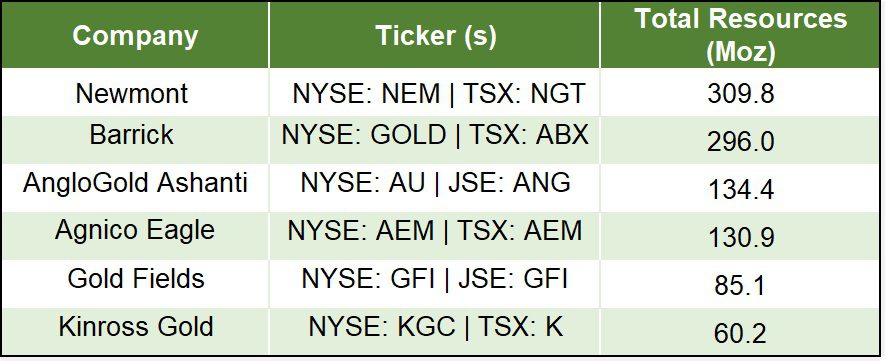Since the beginning of the year, the price of gold is up over 21% to US$2,508 per ounce.
Several factors have contributed to this rise in gold prices:
- Central Bank Buying: Increased purchases of gold by central banks, especially in emerging markets, have been increasing their gold reserves as a diversification strategy against the U.S. dollar and other foreign currencies.
- Geopolitical Tensions: Heightened geopolitical risks have driven investors towards gold as a safe-haven asset.
- Interest Rate Expectations: There have been expectations that the U.S. Federal Reserve might cut interest rates, which historically has increased gold prices.
- Inflation Hedging: Persistent inflation has also led investors to seek gold as a hedge against rising prices.
These factors combined have created a favorable environment for gold, pushing its price to new highs.
Here are some mining companies with significant gold resources that could benefit from the gold price rise this year:
Newmont (NYSE: NEM | TSX: NGT)
- Newmont holds the largest gold resource globally, with 309.8 million ounces, positioning it as the industry leader in gold reserves and production across its extensive portfolio.
- Key Assets:
- Newmont operates major gold mines in North America, South America, Australia, and West Africa.
- In Ghana, Newmont operates the Ahafo and Akyem mines.
- In North America, Newmont owns gold mines in Nevada and Colorado, as well as in Ontario and Quebec, Canada.
- In South America, Newmont’s presence includes operations in Argentina, Peru, and Suriname.
- Newmont also operated the Boddington mine in Western Australia and the Tanami mine in the Northern Territory.
Barrick (NYSE: GOLD | TSX: ABX)
- Barrick has 296.0 million ounces of gold resources and is a dominant player in the gold mining sector with a significant global footprint.
- Key Assets:
- Barrick has significant gold operations in North America, South America, Africa, and Australia.
- Some key mine include the Cortez and Goldstrike mines in the United States (joint venture owned 61.5% by Barrick and 38.5% by Newmont), Pueblo Viejo in the Dominican Republic, Veladero in Argentina, and Kibali in the Democratic Republic of the Congo (DRC).
AngloGold Ashanti (NYSE: AU | JSE: ANG)
- AngloGold Ashanti has a substantial resource base of 134.4 million ounces.
- Key Assets:
- AngloGold operates gold mines across Africa, South America, and Australia.
- AngloGold’s key mining locations include Tanzania, the DRC, Ghana, Guinea, Australia, the United States, Brazil, Argentina, and Colombia.
Agnico Eagle (NYSE: AEM | TSX: AEM)
- Agnico Eagle’s 130.9 million ounces of gold resources, with a focus on high-quality, long-life assets.
- Key Assets:
- Agnico Eagle’s main operations are in Canada, Finland, and Mexico.
- Agnico Eagle operates the LaRonde mine in Quebec, which is one of Canada’s largest operating gold mines, the Kittila mine in Finland, which is one of the largest gold mines in Europe, and the Pinos Altos mine in Mexico.
- The company also runs the Fosterville mine in Australia following its merger with Kirkland Lake Gold in 2022.
Gold Fields (NYSE: GFI | JSE: GFI)
- With 85.1 million ounces of gold resources, Gold Fields operates in key regions such as Africa, Australia, and South America.
- Earlier this month, Gold Fields announced an agreement to acquire Osisko Mining (TSX: OSK) in an all-cash transaction valued at $2.16 billion.
- Key Assets:
- Gold Fields operates mines in South Africa, Ghana, Australia, Peru, and Chile.
- In South Africa, Gold Fields operates the South Deep Gold Mine. In Ghana, operates the Tarkwa and Damang gold mines.
- In Australia, Gold Fields owns four mines located in Western Australia.
- Lastly, in Peru, the Cerro Corona Gold Mine is located in the highest part of the western Cordillera of the Andes Mountains.
Kinross Gold (NYSE: KGC | TSX: K)
- Kinross Gold has 60.2 million ounces of gold resources, with strategic operations focused on North and South America, as well as West Africa.
- Key Assets:
- The Fort Knox mine in Alaska, the Round Mountain and Bald Mountain mines in Nevada, the Paracatu mine in Brazil, and the Tasiast mine in Mauritania, West Africa.
FIGURE 1: Gold Companies with Large Gold Resources

 munKNEE.com Your Key to Making Money
munKNEE.com Your Key to Making Money